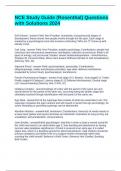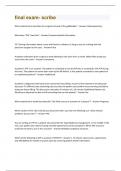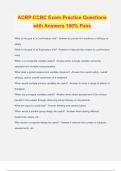Exam (elaborations)
NCE Study Guide (Rosenthal) Questions with Solutions 2024
- Course
- Institution
NCE Study Guide (Rosenthal) Questions with Solutions 2024 Erik Erikson Field: Neo-Freudian, humanistic; 8 psychosocial stages of development: theory shows how people evolve through the life span. Each stage is marked by a psychological crisis that involves confronting "Who am I?" Came up with Ide...
[Show more]












